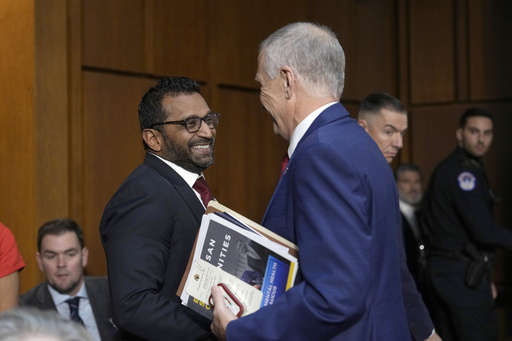
In a party-line decision on Thursday, the Senate Judiciary Committee moved forward with the nomination of Kash Patel as FBI director, despite Democratic apprehensions regarding his potential alignment with Donald Trump and the implications for investigative impartiality. The vote concluded with a 12-10 tally, enabling Patel’s nomination to progress to the Senate for broader scrutiny.
While the timeline for a final confirmation vote remains uncertain, previous nominees once thought to have a precarious path—such as newly appointed Defense Secretary Pete Hegseth and Tulsi Gabbard, who leads national intelligence—have successfully garnered support from Republicans eager to align closely with Trump’s priorities.
Concerns were raised regarding Patel’s previous statements, which have stirred controversy, particularly his disparaging remarks about law enforcement officials who scrutinized Trump, labeling them as “government gangsters.” Some of his prior comments define the individuals charged during the January 6, 2021, Capitol riots as “political prisoners.” These contentious remarks contribute to worries about Patel’s suitability for the significant role of leading the FBI, especially considering his relatively limited management experience.
During Patel’s confirmation hearing last month, he contended that Democrats misconstrued some of his statements or took them out of context. For instance, he argued that his suggestion to replace the FBI headquarters with a museum was intended to highlight concerns regarding the agency’s conduct and not a literal proposal. Furthermore, he rejected claims that a list in his book identifying individuals he described as part of a “deep state” constituted an “enemies list,” calling such interpretations a gross misrepresentation.
Patel, who was nominated by Trump in November to take over from Christopher Wray, would step into an FBI that has experienced considerable upheaval, marked by the departure of several senior executives and an unusual request from the Justice Department demanding identities of agents involved in investigations linked to January 6.
In response to a recent letter from Senator Dick Durbin, the Judiciary Committee’s leading Democrat, which cited undisclosed sources claiming Patel was secretly engaged in discussions about agent dismissals, Patel’s spokesperson characterized the assertions as unfounded “gossip” meant to propagate a false narrative.
Democratic members of the committee depicted Patel as a dangerously inexperienced loyalist who could exploit the FBI’s law enforcement capabilities amid increasing domestic and international threats. Senator Sheldon Whitehouse of Rhode Island expressed his grave concerns over Patel’s judgment, suggesting that his nomination could lead to dire consequences.
Durbin warned committee Republicans of the potential political risks associated with Patel’s confirmation, stressing the critical importance of the FBI to national security. He acknowledged that while Republicans may be compelled to back nominations, they were encroaching on a significant choice that could jeopardize the agency’s future integrity.
In comparison, Republican committee members voiced their support for Patel, arguing that his leadership is necessary to restore trust in an FBI they allege has been compromised by bias during investigations involving Trump. Senator Marsha Blackburn of Tennessee stated that the American public is exhausted by the perceived duality within the justice system and sees Patel as a corrective figure.
Florida Senator Ashley Moody noted that while Patel’s experience within the upper echelons of the FBI may be limited, the agency is in need of fresh perspectives and bold, unconventional leadership.
Having first gained Trump’s attention during his initial term as a key aide on the Republican-led House Intelligence Committee, Patel contributed to a memo criticizing the FBI’s investigation into alleged Russian ties with Trump’s 2016 campaign. He later progressed to a role within Trump’s administration focused on counterterrorism at the National Security Council and served as the Defense Department’s chief of staff.

